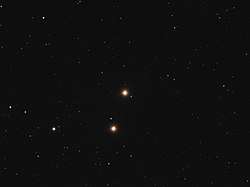Nu1 Coronae Borealis
Nu1 Coronae Borealis is a solitary,[7] red-hued star located in the northern constellation of Corona Borealis. It is faintly visible to the naked eye, having an apparent visual magnitude of 5.20.[2] Based upon an annual parallax shift of 5.0 mas,[8] it is located roughly 650 light years from the Sun. At that distance, the visual magnitude is diminished by an extinction of 0.1 due to interstellar dust.[9] This object is drifting closer with a radial velocity of −13 km/s.[4]
 ν1 Coronae Borealis (upper red star) in optical light | |
| Observation data Epoch J2000.0 Equinox J2000.0 (ICRS) | |
|---|---|
| Constellation | Corona Borealis |
| Right ascension | 16h 22m 21.42545s[1] |
| Declination | +33° 47′ 56.5825″[1] |
| Apparent magnitude (V) | 5.20[2] |
| Characteristics | |
| Spectral type | M2 III[3] |
| B−V color index | 1.64[3] |
| Astrometry | |
| Radial velocity (Rv) | −13.17±0.35[4] km/s |
| Proper motion (μ) | RA: +4.265[1] mas/yr Dec.: −37.877[1] mas/yr |
| Parallax (π) | 5.0069 ± 0.1323[1] mas |
| Distance | 650 ± 20 ly (200 ± 5 pc) |
| Absolute magnitude (MV) | −1.19[3] |
| Details | |
| Radius | 67.1±7.1[5] R☉ |
| Luminosity | 975±30[1] L☉ |
| Temperature | 3,936+565 −295[1] K |
| Other designations | |
| Database references | |
| SIMBAD | data |
This is an evolved red giant star with a stellar classification of M2 III.[3] It is a variable star of uncertain type, showing a change in brightness with an amplitude of 0.0114 magnitude and a frequency of 0.22675 cycles per day, or 4.41 days/cycle.[10] It has about 67[5] times the Sun's radius and is radiating 975 times the Sun's luminosity from its photosphere at an effective temperature of 3,936 K.[1]
References
- Brown, A. G. A.; et al. (Gaia collaboration) (August 2018). "Gaia Data Release 2: Summary of the contents and survey properties". Astronomy & Astrophysics. 616. A1. arXiv:1804.09365. Bibcode:2018A&A...616A...1G. doi:10.1051/0004-6361/201833051. Gaia DR2 record for this source at VizieR.
- Ducati, J. R. (2002), "VizieR Online Data Catalog: Catalogue of Stellar Photometry in Johnson's 11-color system", CDS/ADC Collection of Electronic Catalogues, 2237, Bibcode:2002yCat.2237....0D.
- Huang, W.; et al. (2012), "A catalogue of Paschen-line profiles in standard stars", Astronomy & Astrophysics, 547: A62, arXiv:1210.7893, Bibcode:2012A&A...547A..62H, doi:10.1051/0004-6361/201219804.
- de Bruijne, J. H. J.; Eilers, A.-C. (October 2012), "Radial velocities for the HIPPARCOS-Gaia Hundred-Thousand-Proper-Motion project", Astronomy & Astrophysics, 546: 14, arXiv:1208.3048, Bibcode:2012A&A...546A..61D, doi:10.1051/0004-6361/201219219, A61.
- Dyck, H. M.; Benson, J. A.; Van Belle, G. T.; Ridgway, S. T. (1996), "Radii and Effective Temperatures for K and M Giants and Supergiants", The Astronomical Journal, 111 (1): 521–533, Bibcode:1996AJ....111.1705D, doi:10.1086/117910.
- "nu01 CrB". SIMBAD. Centre de données astronomiques de Strasbourg. Retrieved 2017-08-26.
- Eggleton, P. P.; Tokovinin, A. A. (September 2008), "A catalogue of multiplicity among bright stellar systems", Monthly Notices of the Royal Astronomical Society, 389 (2): 869–879, arXiv:0806.2878, Bibcode:2008MNRAS.389..869E, doi:10.1111/j.1365-2966.2008.13596.x.
- van Leeuwen, F. (2007), "Validation of the new Hipparcos reduction", Astronomy and Astrophysics, 474 (2): 653–664, arXiv:0708.1752, Bibcode:2007A&A...474..653V, doi:10.1051/0004-6361:20078357.
- Famaey, B.; et al. (January 2005), "Local kinematics of K and M giants from CORAVEL/Hipparcos/Tycho-2 data. Revisiting the concept of superclusters", Astronomy and Astrophysics, 430 (1): 165–186, arXiv:astro-ph/0409579, Bibcode:2005A&A...430..165F, doi:10.1051/0004-6361:20041272.
- Koen, Chris; Eyer, Laurent (2002), "New periodic variables from the Hipparcos epoch photometry", Monthly Notices of the Royal Astronomical Society, 331: 45, arXiv:astro-ph/0112194, Bibcode:2002MNRAS.331...45K, doi:10.1046/j.1365-8711.2002.05150.x.